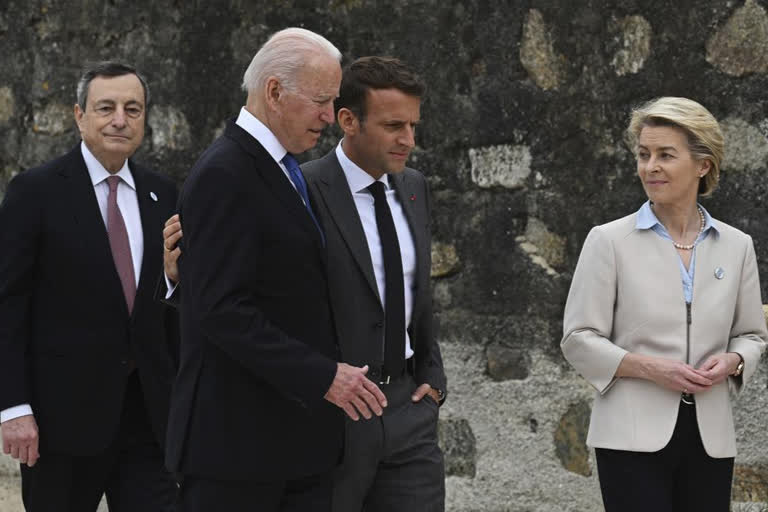Carbis Bay: The United States plans to push democratic allies on Saturday to publicly call out China for forced labor practices as the Group of Seven leaders gather at a summit where they will also unveil an infrastructure plan meant to compete with Beijing’s efforts in the developing world. The provocative proposal is part of President Joe Biden’s escalating campaign to get fellow democratic leaders to present a more unified front to compete economically with China in the century ahead, according to two senior administration officials who briefed reporters on the condition of anonymity because they were not authorized to discuss the plans publicly.
The officials said Biden wanted G-7 leaders to speak out in a single voice against forced labor practices targeting Uyghur Muslims and other ethnic minorities. Biden hopes the denunciation will be part of the joint communique released at the summit’s end, but some European allies have been reluctant to so forcefully split with Beijing. It may not be clear until the three-day summit ends on Sunday whether the leaders will take that step. The wealthy nations’ leaders were all smiles Friday as their host, British Prime Minister Boris Johnson, welcomed them to the summit on the freshly raked sand of Carbis Bay in southwest England for their first gathering since 2019.
Last year’s gathering was canceled because of COVID-19, and recovery from the pandemic is dominating this year's discussions, with members of the wealthy democracies' club expected to commit to sharing at least 1 billion vaccine shots with struggling countries. China also loomed large over the meeting on the craggy coast of Cornwall. Biden's proposed critique of China's labor practices was to be raised as the allies unveil an infrastructure proposal dubbed “Build Back Better for the World,” a name echoing the American president's campaign slogan.
The plan calls for spending hundreds of billions of dollars in collaboration with the private sector. It's designed to compete with China’s trillion-dollar “Belt and Road Initiative,” which has launched a network of projects and maritime lanes that already snake around large portions of the world, primarily Asia and Africa. Critics say the projects often create massive debt and expose nations to undue influence by Beijing.
Read:UN rights chief warns of escalating violence in Myanmar
Britain also wants the world’s democracies to become less reliant on economic giant China. The U.K. government says Saturday’s discussions will tackle “how we can shape the global system to deliver for our people in support of our values,” including by diversifying supply chains that currently heavily depend on China. Not every European power has viewed China in as harsh a light as Biden, who has painted the rivalry with the techno-security state as the defining competition for the 21st century. But there are some signs that Europe is willing to put greater scrutiny on Beijing.
Weeks before Biden took office last year, the European Commission announced it had come to terms with Beijing on the Comprehensive Agreement on Investment, a deal meant to provide Europe and China greater access to each other’s markets. The Biden administration had hoped to have consultations on the pact. But the deal has been put on hold, and the European Union in March announced sanctions targeting four Chinese officials involved with human rights abuses in Xinjiang. Beijing responded by imposing sanctions on several members of the European Parliament and other Europeans critical of the Chinese Communist Party.
Biden administration officials see the moment as an opportunity to take concrete action to speak out against China’s reliance on forced labor as an “affront to human dignity." While calling out China in the communique wouldn't create any immediate penalties for Beijing, one senior administration official said the action was meant to send a message that the G-7 was serious about defending human rights and working together to eradicate the use of forced labor.
Read:India hands over medical equipment worth over Rs 18 crore to Nepali Army
An estimated 1 million people or more — most of them Uyghurs — have been confined in reeducation camps in China’s western Xinjiang region in recent years, according to researchers. Chinese authorities have been accused of imposing forced labor, systematic forced birth control, torture and separating children from incarcerated parents. Beijing rejects allegations that it is committing crimes. The leaders of the G-7 — which also includes Canada, France, Germany, Italy and Japan — also hope the meeting at the seaside resort will energize the global economy.
